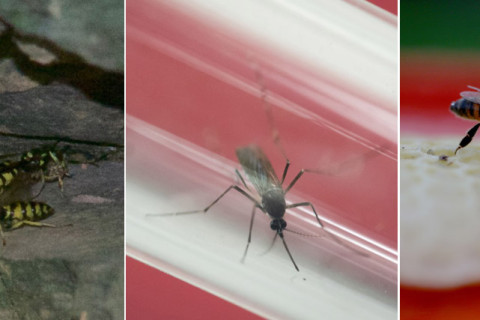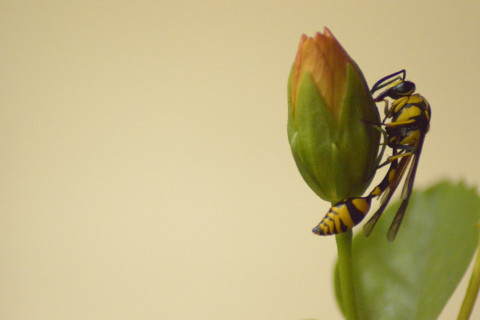A week to be mosquito-aware
The American Mosquito Control Association has declared June 25-July 1 to be “Mosquito Control Awareness Week.” It’s a great opportunity to remind you how to easily — and safely — take actions now to diminish the number of mosquitoes that would otherwise plague your backyard later in the summer.
Step one: Clean up your landscape
You (hopefully) already know to get rid of large prime breeding sites, such as old tires and tarps. But mosquitoes don’t need big sources of water to breed: They can raise a family of biters in something as small as a discarded bottle cap, or in the wet folds of a plastic bag that got blown or tossed under a shrub.
So make the next nice day a clean-up day for your landscape and get rid of all yard trash, especially in out-of-the-way places. You’ll prevent future problems and have a nicer-looking yard.
Emptying standing water is no longer enough
Dr. Dina Fonseca, an entomologist at Rutgers University, is on a mission to educate homeowners that old-school methods are no longer enough to prevent mosquito problems near your house. That’s because there are two very different types of mosquitoes with very different habits in our region, she explains. And the more-recent arrival — the disease-carrying, day-flying Asian tiger mosquito (Aedes albopictus) — cannot be controlled by the methods that we used to rely on.
That’s because these daytime biters overwinter in the egg stage, but those eggs aren’t floating on the surface of standing water. They’re attached (kind of “glued”) to the inside surfaces of water-holding objects, ready to be activated when the weather warms and the water level inside the object rises high enough to envelop the eggs.
So just dumping water out of wheelbarrows, recycling bins, children’s toys and the like isn’t going to take down these new terrors. You’d have to scrub their eggs off any items that can hold water to destroy their capacity to breed.
Getting rid of old-school water breeders
The Culex mosquitoes we all grew up with — the ones that mostly bite when day changes over into evening — have a very different life cycle than their day-flying counterparts. The last females of summer hibernate in the adult stage in sheds, garages and other protected areas. Then they emerge on the first nice day of spring looking for a blood meal.
After they get that meal, they seek out standing water in which to lay their eggs.
The old advice to frustrate these biters was to dump any standing water on your property to deny the mosquitoes any potential breeding ground. And that’s still excellent advice. But now there’s a new twist on that advice that uses water against them.
Dropped into standing water, Bti (Bacillus thuringiensis subspecies israelensis) — the active ingredient in those mosquito dunks and granules you see in hardware stores and garden centers — prevents eggs from developing into biting adults. So if you deliberately put out standing water laced with Bti, the females will lay their eggs in the water, but no new mosquitoes will be born.
And Bti (a naturally occurring soil-dwelling organism) is nontoxic to all other creatures; it has no effect on fish, birds, pets, people, toads, etc.
The biggest brand name you’ll find at retail stores is Summit. They offer a wide array of formulations. And the mail-order firm Gardens Alive sells Bti in granular form as “No-Squito” (which, they tell me, is supposed to rhyme with mosquito.)
Don’t be foiled by flowers
Fonseca also told me something that I had not previously known about mosquito behavior.
Early in the spring, biting females (who we tend to think of only as blood suckers) also feed on the nectar of small-flowered plants for energy. But those are the exact same kinds of plants skilled gardeners use to lure pollinators and beneficial insects to their backyards!
The answer? Once again: Bti traps.
Place small containers of water near your earliest-blooming flowers, treat the water with Bti and the females who visit the flowers will lay their eggs in this convenient water source but no adult mosquitoes will emerge!
And don’t forget to check your gutters
To review:
- Empty and scrub plant saucers, outdoor children’s toys, recycling bins and anything that can hold water.
- Don’t let those containers fill up with water again (unless you treat the water with Bti).
- Clean up any trash in the yard, especially small trash. One of Fonseca’s colleagues has shown that the Asian tiger mosquito can go from egg to adult using the amount of water in a bottle cap.
- Put containers of water laced with Bti around your home and freshen up the Bti as directed.
- Make sure some of those traps are near early-blooming flowers.
- And if you have gutters, clean them out as well. They don’t even have to be clogged to be dangerous; just a low spot that doesn’t drain well can breed these ancient disease-carrying enemies of mankind.
Mike McGrath was Editor-in-Chief of ORGANIC GARDENING magazine from 1990 through 1997. He has been the host of the nationally syndicated Public Radio show “You Bet Your Garden” since 1998 and Garden Editor for WTOP since 1999. Send him your garden or pest control questions at MikeMcG@PTD.net.







